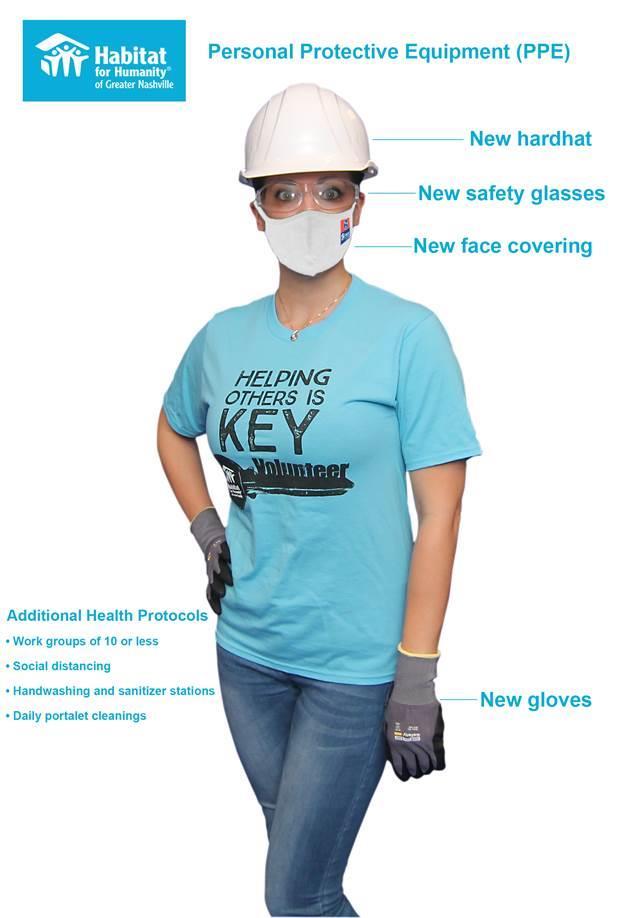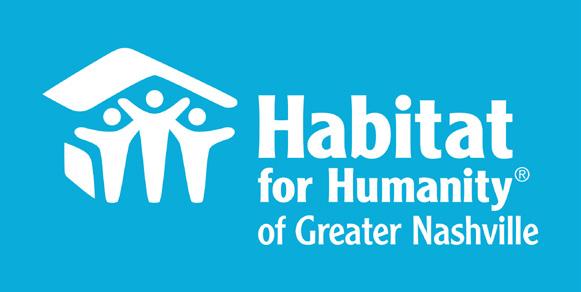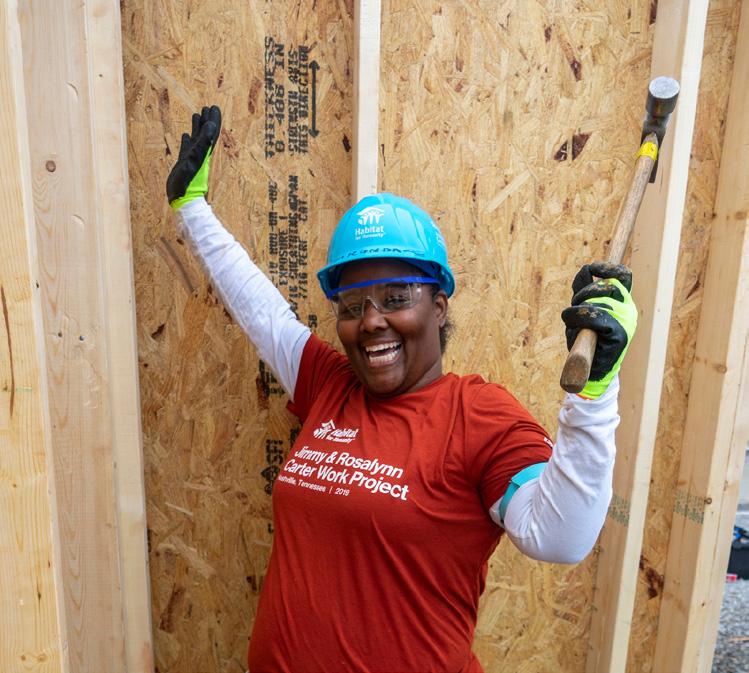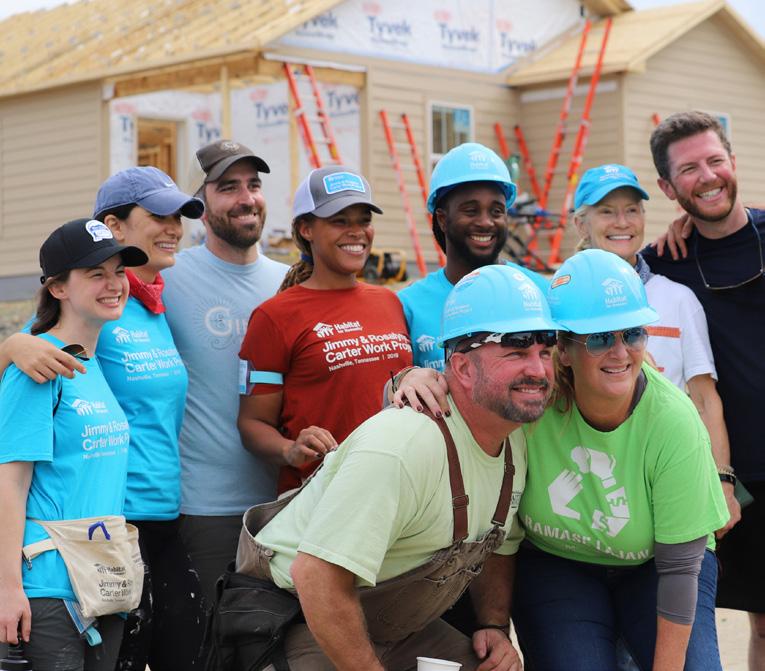
20 minute read
Place the link on your organization’s website. Make sure to always include the
Food Service Coordinator
Overview
Advertisement
Some volunteers are more comfortable in the kitchen than on the job site. Helping with food is a great opportunity for them to be involved. Food service volunteers may prepare and/or serve the food. Depending on your circumstances, you may have one person prepare the food and another deliver and serve the food. We recommend two food coordinators for your build and two or three food servers each day.
**Please Note: Please plan to provide food and drinks for ALL volunteers building on the house. This includes your volunteers, our future Habitat homeowner(s), Habitat staff,
and Supervisors on Site (SOS) (who are also volunteers).
Food Needs
Breakfast o Provide breakfast for 15 people (not all volunteers eat breakfast, so food for 15 is fine). o Suggested items for breakfast include: Bananas, apples, muffins, donuts, breakfast bars, biscuits (ham, sausage, and/or egg) Water, coffee, hot cocoa, fruit juice Avoid serving only sweets, volunteers will need protein o Set up breakfast by 7:00 a.m. so volunteers can eat before the safety meeting at 7:30 a.m.
Lunch
o Provide a hearty lunch for 30 –35 people (this includes your volunteers, our future Habitat homeowner, SOS, and Habitat staff). o Suggested items for lunch include: Meat sandwiches, hamburgers, hotdogs, chicken, chili, burritos, BBQ, tacos, spaghetti Fruit salad, pasta salad, chips, cookies, brownies Avoid food items that can go bad in the heat. o Make sure lunch is ready by 11:15 a.m. The crew will break for lunch at 11:30 a.m. sharp. If food arrives earlier, please keep volunteers building until 11:30 a.m. It is very helpful to Habitat staff and SOS when everyone breaks for lunch at the same time. o Provide a hearty lunch with a few options to accommodate various dietary needs.
You may want to check with our future Habitat homeowner to see if they have any special needs. Make sure to include beverages for lunch in your planning.
Snacks
o Make snacks available to your volunteers throughout the day. o Suggested items for snacks include: Bananas, apples, cookies, protein bars, granola bars, trail mix, etc. Individually wrapped snacks are the easiest.
Water (hydrate –hydrate –hydrate)
o Provide 6 –8 cases of water for your build day. In addition to water, you can also provide sports drinks like Gatorade and PowerAde. o Use bottled water as opposed to large water coolers with cups so that volunteers can carry bottles with them and hydrate more regularly.
Supply Needs
Hand Sanitizer Trash Bags Eating Utensils (plastic ware) Paper Towels Plates Sunscreen or other seasonal items Coffee Cups Cream/Sugar Extra Tables (optional) Extra Popup Tent (optional) 2 –3 Chairs for Food Servers (optional)
Food and Supply Deliveries
People brining food, drinks, or supplies for the build may drive straight to the build site and deliver at the house. After unloading, we kindly ask you to move your car and park in the designated parking area in the neighborhood. It is very important to keep the street clear for pedestrian traffic, construction vehicles, and other deliveries.
What Habitat Provides
One 10x10 popup tent and two folding tables –these items will be delivered to the build site each morning. Power access –Bring a long extension cord if you need power. Habitat does have extension cords, but they may not be unpacked when you arrive early and they will be utilized by build tasks during the day.
Helpful Tips
Make the coffee at home and bring in a thermal container OR buy disposable containers of coffee at Krispy Kreme, Duncan, Starbucks, etc. This will help save time in the morning. Keep sugary foods and drinks to a minimum because they may cause upset stomachs as well as sugar highs and lows. Check with your volunteers and future Habitat homeowner(s) regarding dietary restrictions to ensure that everyone has plenty to eat and drink (someone might be vegetarian or have religious restrictions). Ask vendors you use regularly, for example, a caterer, if they are willing to donate food or provide a price break. Also, some local restaurants may donate or offer a discount.
Thank you for your coordination efforts in recruiting and managing your volunteer team!
Fall 2020 | Dickson
Kami Dugan

Kami looked around the Habitat classroom with both of her sons ages 10 and 5 watching her and said definitively, “I never thought I would be able to do this without a man.” Habitat for Humanity’s homeownership program is empowering her to take care of her children in a new and bold way. “I want to be a better mother,” she offered. “I want my children to have a home… to let them be kids.”
Kami has worked for Bridgestone APM as a production operator for six years. She works a lot of extra hours to provide for her sons and Kami’s mother, who runs a daycare center, helps watch over the children. The family currently lives in an apartment complex that is over 100 years old and that has electrical issues, which makes Kami worry about the apartment being a fire hazard. A friend told her about Habitat for Humanity’s homeownership program and the affordable monthly mortgage and she applied. “No one in my family has ever owned a home,” she explains. “I’ve never experienced a home. I’ve rented for nine years and it isn’t the same. Being a one-income family, I never thought I could get a decent home without a lot of repairs. Kami’s goal with homeownership is to stabilize their lives. “Stability is important for a child. I hope this will motivate them to succeed in life and become homeowners. Hard work pays off.” Kami is excited about the budget classes and actually getting to build on her home with her sponsors. She says being the only girl out of four siblings and also raising two sons, she is most excited about having her own bathroom. To her sponsors she says, “Thank you! Your generosity and kindness changes lives everyday like ours. I am very grateful for this opportunity.”
At A Glance:
• Kami thought she could never own a home without a second income. • She has worked for Bridgestone APM as a production operator for six years and works a lot of overtime to provide for her family. • The family currently lives in an apartment complex that is over 100 years old and that has electrical issues, which makes Kami worry about the apartment being a fire hazard. • “No one in my family has ever owned a home,” she explains. “I’ve never experienceda home. I’ve rented for nine years and it isn’t the same.”

Homes for Hardworking Middle Tennesseans



Habitat homeowners Michele, Neema and Quashawnta work in the healthcare industry. Habitat homeowner Theresa works for Metro Nashville Public Schools.
Habitat provides homeownership opportunities for hard working men and women in five counties: Davidson, Dickson, Wilson, Cheatham, and Robertson and operates retail stores, the ReStores, in Davidson, Wilson, and Dickson. Habitat of Greater Nashville was established in 1985 and has built, recycled, or renovated more than 1,285 homes, 920 homes locally, and has served more than 3,268 family members, including more than 2,060 children.
Habitat builds ENERGY STAR certified homes and has been recognized by the Environmental Protection Agency 11 consecutive years for sustained excellence in affordable housing, which helps homeowners save an average of $25,000 in electric costs over the life of the mortgage.

Homeownership
Habitat homes are not free. Habitat of Greater Nashville engages volunteer labor and sponsor support to offer qualifying low-income families a 0% APR 30-year mortgage loan based on the appraised value of the house. To qualify, future homeowners must fall within income guidelines (maximum 80% of area median income), be able to pay for closing costs, make a monthly mortgage payment, including taxes and insurance, and be willing to complete the Habitat homeownership training program.
Future homeowners in the program invest at least 200 hours, which includes homeownership classes and working on the build site to earn the opportunity to purchase a Habitat home. The homeownership training program can take 6-12 months.
Bassam has worked as a banquet steward at Omni since 2013.
Mission: Seeking to put God’s love in action, Habitat for Humanity brings people together to build homes, communities and hope.
Volunteers
Habitat is a licensed home builder that utilizes volunteer labor to fulfill its mission. Habitat builds in 8-day cycles utilizing volunteers on the weekends with paid subcontractors scheduled during the week to complete code related tasks. Habitat utilizes an average of 20-25 volunteers per house per day. Build days start at 7:30 a.m. and end in the afternoon when the day’s work is done. Volunteers are also utilized at the ReStore and in the homeownership training program.



Investment
Current sponsorship of a Habitat home is $63,000; 100% of sponsor dollars go toward building costs of that home. More than 90 corporate and faith based organizations, along with additional funding from grants, individual donations, special events, and gifts-in-kind support the mission.
The impact of an investment into Habitat is immeasurable. Statistics show that children who grow up in homes are more likely to graduate from high school and college and to become contributing members of the community. Habitat homeowners pay close to $1 million in property taxes, supporting vital community services.
Retail
Habitat of Greater Nashville operates retail centers, the ReStores, in three counties that are open to the public and sell used and new home and office furnishings and building supplies donated from individuals and companies. Proceeds from the ReStores have helped fund homes for more than 30 hard working families over the last decade.

Individuals who wish to donate to the ReStore can drop their items at any ReStore location, found at: www.habitatnashville.org. For larger items, the ReStore offers FREE pick up by calling: 615-942-1290.
Remodeling? Renovating? Want to save some money and fund good works? Habitat’s skilled deconstruct professionals will remove your kitchen cabinets, appliances, doors, windows and more for FREE when you donate them to Habitat. Call 615-942-1273 for more information.
Greater Nashville 414 Harding Place, Nashville, TN 37211 615.254.4663
Wilson Division 606 East Main Street Lebanon, TN 37087 615.453.4539
Dickson Division
223 Dickson Plaza Drive Dickson, TN 37055 615.441.9967
Cheatham/Robertson Divisions
102 Frey Street Ashland City, TN 37015 615.441.9967

SAFETY HANDBOOK FOR HABITAT VOLUNTEERS
This handbook is intended to provide you with a general orientation to volunteering with Habitat for Humanity of Greater Nashville (Habitat Nashville) and a basic understanding of our policies. You are encouraged to familiarize yourself with the contents of this handbook, as it will answer questions related to your volunteer work with Habitat Nashville. However, this handbook cannot anticipate every situation. Habitat Nashville reserves the right to change, add to, or eliminate policies described below at any time and without notice.
You can find an electronic copy of the Safety Handbook and more information about Habitat for
Humanity of Greater Nashville at: https://www.habitatnashville.org/volunteer
Volunteer Responsibility:
I am volunteering to work at Habitat Nashville’s build site at my own risk after reading the Habitat
Nashville Safety Handbook. If for any reason I believe that my working at the build site might endanger myself or others, I must report this to the SVP of Construction immediately. This might include, among other things, physical impairments, medication (prescription and otherwise that might impair my judgment) or communicable diseases. If I encounter an injured person at the build site, I should not attempt to provide medical attention to the person unless I am a licensed medical professional. If I encounter an injured person at the build site, I must notify the assigned Safety Coordinator and the Construction Director immediately.
SVP of Construction
Chip Wilson (615) 942-1229 (ofc) (615) 633-6111 (cell)
Human Resource Manager
Martha Grindeland (615) 942-1217 (ofc) (615) 260-0595 (cell)
President and CEO
Danny Herron (615) 942-1218 (ofc) (615) 305-4095 (cell)
CAO
Lucile Houseworth (615) 942-1250 (ofc) (615) 210-3554 (cell)
Construction Staff & Volunteer Manager
Jeremy Lawson 615.818-8000 (cell)
414 Harding Place Suite 100 Nashville, TN 37211 Phone (615) 254-HOME (4663)
Our Mission
Seeking to put God’s love into action, Habitat for Humanity brings people together to build homes, communities and hope.
General Policies Unlawful Harassment and Discrimination
Habitat Nashville expects all volunteers to behave in a way that reinforces the Christian mission and founding principles of the organization. All volunteers should be accorded respect and consideration and feel that Habitat Nashville provides a safe and productive environment. Habitat Nashville prohibits any actions or conduct that may discriminate against or harass others.
If you feel that you have been harassed, you should notify the Manager on Duty of your concerns without delay. Habitat Nashville will investigate all claims of harassment.
Resolving Issues with Others
As in all workplaces, personal differences may occur among individuals. It is important for you and Habitat Nashville that issues are not allowed to fester and detract from your important contribution to this ministry.
We believe that the quickest way to resolve the issues is to approach the individual(s) involved so that an appropriate solution can be reached. If this initial conversation does not lead to resolution or you feel uncomfortable discussing the matter with the person directly, we ask that you speak with a supervisor or Manager on Duty to resolve the matter.
Workplace Violence Policy
Habitat Nashville can best perform its mission when all associates coexist in a climate that supports a free exchange of ideas and utilizes constructive methods of conflict resolution. Habitat is committed to creating and maintaining an environment free from disruptive, threatening and violent behavior.
Habitat Nashville Equipment and Property
Please be respectful of Habitat Nashville property, tools, and equipment. Take good care of tools and supplies so that they remain in good and safe working condition. You can help us keep our costs down with proper use and storage of all tools, equipment, and supplies.
Drug and Alcohol Policy
Habitat Nashville is a Tennessee Drug Free Workplace. The unlawful manufacture, distribution, dispensing, possession or use of controlled substances is prohibited at all our work sites. At no time is alcohol permitted at the Habitat Nashville build site, ReStores, or office.
Smoking
Habitat Nashville is committed to creating and maintaining an environment that is safe and healthful. Please refrain from using tobacco products inside Habitat houses.
We’re Proud of our Safety Record
Habitat Nashville is especially proud of its safety record. Our injuries consist mostly of a hammer and thumb meeting or simple splinters. We are providing you this booklet to help us maintain an excellent safety record.
Safetyis extremely important to everyone involved with the Habitat program around the world. Accidents can be costly in pain and stress to the injured, costly in dollars and time, and at the very least, disruptive. Please remember 99 percent of safety is pure common sense and attitude.
Safety is everyone’s concern. Every volunteer on a Habitat Nashville site becomes a safety leader the moment he/she arrives. An observer can often see danger better than the worker involved in the project and it is his/her obligation to speak to the worker and the supervisor. Since Habitat work crews normally have a high proportion of inexperienced people, everyone must pay particular attention to safety.
Be conscious of the safety of others as well as your own. Be cautious at all times. Safety is based on knowledge, skill and an attitude of care and concern.
Ask questions. There is a supervisor or manager on each site that can help you identify inherent hazards and instruct you on how to avoid them.
Safety Coordinators
We recommend that each sponsor have one person as the designated Safety Coordinator for the job site for each day. The Safety Coordinator will be knowledgeable of everything in this Safety Handbook. The Safety Coordinator’s primary responsibility is to watch for safe working conditions and enforce safety rules.
Supervisors on Site (S.O.S.)
Our Supervisors on Site, or S.O.S. as they are called by Habitat Nashville, are skilled volunteers who work with our construction staff to train and supervise you. They will instruct you about the correct and proper procedures for performing each task.
You can identify the S.O. S. volunteer by a nametag, hat or t-shirt.
Guidelines for a Safe Build
Be honest about your comfort level. There is no need to be a hero on a Habitat build. If the thought of working at heights bothers you, stay off ladders.
Think about your task. If you are uncertain about how to accomplish your task or how to operate a tool or piece of equipment, ask a supervisor.
If you must use your cell phone, move away from the immediate build area and away from the street to a safe area until you are finished.
Concentrate on the task at hand.
Avoid distractions.
Inspect all power tools, hand tools, ladders and scaffolding. If any unsafe tools or conditions come to your attention contact the supervisor immediately.
Proper Safety Equipment
Wear appropriate clothing. This is as important to safety as the proper selection and use of tools. Loose clothing is dangerous around power equipment. Workers should wear boots or thick-soled, closed-toe shoes. Any person wearing sandals or flip flops will not be allowed to remain on the job site.
Wear hard hats. They are available onsite and must be worn if anyone is working above you or when determined necessary by the supervisor.
Wear protective eyewear. Eyewear is available onsite and should be worn when using power tools or when determined necessary by the supervisor.
Wear dust masks. Dust masks are available onsite and should be worn when installing insulation or in heavy dust situations.
Wear earplugs. They are available onsite and should be used when subjected extended period of time. to loud noises for an
Power Tools and Other Electrical Devices
Wait for proper instruction. Each volunteer should receive instructions before a power tool is used, including what could happen if not used correctly. A supervisor should give instructions to all volunteers, including experienced do-it-yourselfers.
Check for defects. Check all power tools –switches, cords and plugs. Pay special attention to blade guards to make sure they operate correctly. Under no circumstances should you ever disable a blade guard. Defective tools should not be used and the supervisor should be notified so that they can remove the tool from service immediately.
Examine extension cords. They should be of sufficient size (check with the supervisor) and in good condition. Keep cords out of mud or water and avoid stepping on them.
Hand Tools
Select the proper tool. Make sure you are using the right tool for the job at hand and make sure it’s the proper size. If you’re unsure, ask the supervisor.
Check the condition of the tool. Avoid tools with loose handles or tools that are dull. Oil or dirt on a tool can cause it to slip. Make sure the tools are clean.
Hold tools correctly. A hammer should be held at the base of the handle to ensure maximum efficiency, while a knife should be held in such a manner as to allow you to cut away from your body.
Handle and carry all tools with care. Carry only a few tools at a time or carry them in a tool belt with special compartments. Keep sharp or pointed tools pointed away from you. Be conscious of where you lay your tools down. Never lay a hammer down on the slope of a roof or the top of a stepladder.
Use extreme caution with a saw. Never bind a saw blade, especially a power saw. It can result in a very dangerous bucking action that can cause serious injury. Support what you are cutting in a proper fashion to avoid kickback or to prevent a cut board from falling where it could drop on someone.
Nail guns have the potential to cause serious injury. It is important to always use nail guns with caution and to review all safety measures and warnings before using a nail gun. Keep hands and fingers out of the line of fire and aim the gun away from the body and make sure the tool is placed firmly against the work piece.
Ladders Inspect all ladders before use.
and any defects. If the ladder is unsafe, don’t use it. Look for wear and tear, loose rungs
Use ladders of proper length.
An extension ladder should reach three feet above the work level.
Move your ladder with your work. Don’t lean too far. If both of your shoulders are outside the ladder you are leaning too far and serious injury could occur.
Set your ladder at the proper angle. For every four feet of height, the bottom of the ladder should be one foot away from the wall. You are at the correct angle if, when you place your toes against the base of the ladder and stand erect, you can reach out and grasp the rung at shoulder height.
Place your ladder on solid footing. Avoid mud or gravel. If there is a risk of the ladder slipping, tie or stake the ladder down. If the ladder is not level, dig the ground out from under the high leg rather than “block up” the other leg. Always face the ladder. Carry tools in a container so that your hands are free to climb.
Be cautious with aluminum ladders.
weather or on windy days. Never use an aluminum ladder near electrical lines, in inclement
Scaffolding
Use the proper scaffolding. All scaffolding must be designed to support four times the weight of the worker and materials resting on it. Special care should be taken to ensure scaffolding components are compatible.
Inspect scaffolding every day. When erecting scaffolding, make sure the legs are resting on adequate sills and that the equipment is plumb and level.
Many scaffolding accidents occur when the walk boards are inadequate or defective.
frequently and remove any defective or suspect pieces. Inspect planking
Clean Jobsite & Tool Care
Maintain a clean job site. Keeping a neat and organized work site contributes to efficiency and is important in preventing accidents.
Clean up all trash and scrap as you go. Do not allow wood scraps, nails or any trash to pile up. They interfere with work and can be a hazard.
Keep up with tools and equipment that are not being used and return them to the tool container.
protects the tools as well as the workers. This
Covid-19
Habitat for Humanity of Greater Nashville has been actively monitoring The Centers for Disease Control and Prevention (CDC) guidelines and the evolving parameters recommended by the State of Tennessee. We want to assure you that Habitat Nashville is dedicated to protecting the safety and well-being of our volunteers, staff members and partners. As such, the following safety measures have been implemented on site this build season.
Habitat volunteers will follow recommended CDC guidelines for social distancing Any volunteer or staff member who does not feel well or who is running a temperature, showing signs of acute respiratory illness or difficulty breathing should not come to the build site. Volunteers will work in groups of 10 or less. All volunteers will be given new, personal protective equipment (PPE) - hardhat, safety glasses, gloves and a face covering and will be required to wear these items while on the build site. Volunteers may bring their own face coverings, gloves and safety glasses, personal sunglasses and/or regular glasses will substitute for safety glasses. No PPE will be shared. Habitat construction staff and SOS will also wear PPE. Hand washing stations and hand sanitizer stations will be available at the build site. Portalets will be cleaned daily. In order to provide a safe and sanitary breakfast and lunch option, we have implemented the requirement that all food be served in individual disposable containers (boxed lunch style).


